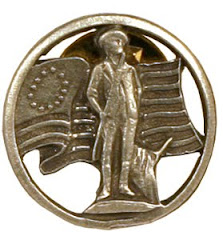One of the things about which I am passionate is history. I am fascinated with Patton's attack on Sicily. I am fascinated with Vincent Strong's defense of Little Roundtop. I am fascinated by Sam Houston's victory over Santa Anna. There is a consistent theme to these battles, which is that if you can choose the ground on which you fight, you can negate the enemy's advantages and control the battle.
On the table next to my bed is also the book by Sun Tzu, "The Art of War". It teaches you how to go about dealing with forces that are arrayed against you, whether on purpose or by consequence of circumstance, and much of it deals with the notion that good people are usually those who come under attack from others. People are going to talk about you and judge you no matter what you say or do or how you live. People are always going to find it uncomfortable to live like you because they are not you. Some of those people will engage in an active, albeit covert, attempt to bring you down as a means to elevate themselves.
History has taught us that the defender is usually in a tough position. The attacker has the element of surprise and the advantage that they decide how the attack will proceed. By contrast the defender has to anticipate what MIGHT happen and prepare with limited resources against what option(s)they suspect the attack might select. History is rife with examples of defenders who are overrun whose preparations for defense then serve the attacker. If he is able to take our strongholds, the capital parts of the land, he chooses what must be done in order to ultimately dislodge him and drive him back out.
War has demonstrated that with rare exception the defender cannot defeat the attacker in the strongholds the attacker has built. We must draw them out in order to even the playing field. A winning defense strategy for a passive defender requires that you govern at least where the battle is fought. You choose the field of battle, and you can control the outcome better than if you let him dictate. This is how Patton cleared most of Sicily while Montgomery was bogged down on the east coast and how Strong held the high ground with a single brigade against two divisions under Hood at Gettysburg and how Houston finished off Santa Anna's numerically superior force in about an hour. Every aggressor has his Waterloo, and if we can bring him to it, we can control the fight.
Too many people let their denigrators choose the field of battle. They begin with a premise, to which we respond. They claim they have the high ground and try to deprive us of it. They start the fight and then invite us to dash ourselves against the beaches of Normandy in wave after wave of fruitless effort attacking them where they are strong. For example, Romney keeps letting Obama choose the ground on which to fight. His political statements always parrot where the President chooses to steer the conversation. However, we can choose where we would like to fight and force them to come against you. You do that best by going after things we know they desire to defend or by setting a direction and forcing them to follow you.
It has been said that the best defense is a good offense. The leading army (the one that is out in front, not the one with the best scores) is the one who determines where the battles are fought. He sets the terms, the location, and the subject of the conflict. It is possible, on ground of good choosing, for a small force to eliminate a far larger one, even sometimes without any bloodshed. You do that by being proactive and setting the stage that forces them to come to you. People will always talk about and be critical of you. Let them. They just want a reaction. You can set the terms and fight on ground of your own choosing.







